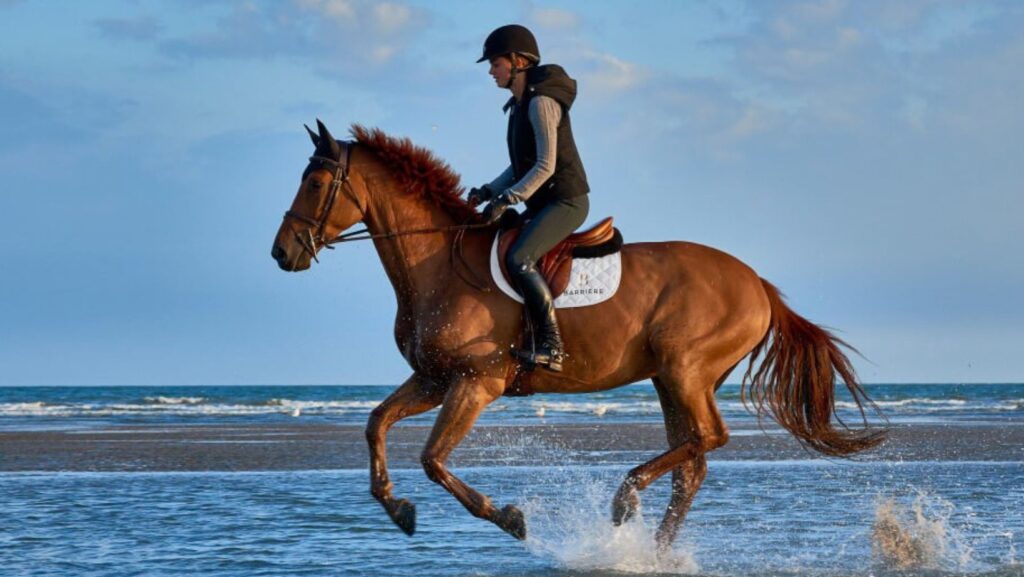Ever wondered why some people seem smarter after a gallop? No, it’s not because they’ve figured out how to avoid horse poo. It turns out that horse riding isn’t just a physical workout; it’s a brain exercise too!
Forget about traditional classrooms and picture this: a kid, a horse, and a wide-open field. It sounds like the start of a feel-good movie, doesn’t it? But it’s not just heartwarming – it’s educational.
A study by Peach Essay found that horse riding improves mental health, flexibility, circulation, muscle tone, strength, balance, and coordination. So, next time someone says you’re just sitting on the horse, tell them you’re actually in a full-body-and-mind workout session!
Most people avoid horseback riding just because it looks challenging and they’ve never tried it before. With that said, learning horseback riding is much more simple than learning how to bet on horse racing in TwinSpires.
All you need is someone to guide you through the process, and you’ll quickly get the hang of it.
Benefits of Horseback Riding
So, you might be wondering how riding a horse makes you smarter. According to Frontiers in Public Health, the vibrations from horse riding activate the sympathetic nervous system, which is like a turbo-boost for learning in children.
Plus, engaging in a quick ‘Go/No-go’ decision-making test after riding a horse can sharpen your reflexes more than solving math problems.
Imagine a young rider perched atop a horse, learning more than just how to hold the reins. Equestrian education goes beyond riding skills. It’s about responsibility, empathy, leadership, and confidence. And let’s be honest, learning to communicate with a 1,000-pound animal requires patience and understanding that rivals some of the most challenging human interactions.
The Social Effect
Let’s not forget the social buffet horse riding offers. William Woods University suggests that riding encourages healthy living and youth development.
Imagine the social skills you gain when trying to convince a half-ton animal to jump over a fence. And don’t even get me started on the community building. Horse riding is a mixer event with added manure.
The Physical Aspect of Horseback Riding
Did you know that horseback riding is akin to physical therapy? It mimics the human walking motion, making it excellent for building balance, strength, and flexibility.
But wait, there’s more! It’s also a mental health booster.

A study from Washington State University found lower cortisol levels – the stress hormone – in children participating in equestrian activities. So, riding is not just about staying fit; it’s about keeping your cool in a world that’s often anything but.
Can it Replace Real Education?
But what about real education? I’m glad you asked. Some programs incorporate academic learning with equestrian activities.
Just because horse riding can boost your intelligence doesn’t mean you should avoid learning in the classroom. Horse riding is a great addition to the educational system, not a replacement, so you’ll still need algebra.
However, if we find a way to incorporate equestrian activities into education, this will help students focus, learn, be happy, have a social life, and improve their overall mood. This will result in better grades and more efficient learning.
On top of that, learning about horse anatomy or maintaining a riding journal can be more engaging than traditional classroom settings.
Equestrian Programs in College
For the college crowd, horse riding is not just about donning fancy boots and looking cool. Equestrian programs in colleges like Stanford and Texas A&M offer a balance between academic studies and equestrian sports.
Being part of a horse-riding team is like getting an express ticket to developing teamwork and leadership skills. Who knew avoiding being thrown off a horse could teach you so much about life?
This is important, especially when we consider that youngsters are nowadays battling anxiety and depression and choose to isolate themselves socially. Horse riding activities include many people where you can make friends, boosting your overall mood.
The happier you are, your brain works more efficiently, especially when learning new stuff.
How Does Horse Riding Impact Intelligence?
As you can see, horseback riding isn’t about learning but developing crucial skills that will impact your intelligence. The activity will help you improve your balance, core muscle strength, and cardiovascular system.

And remember, a healthy body equals a healthy mind.
Being around horses can impact your intelligence, helping you develop real-world skills that might be very beneficial.
Final Words
So, there you have it. Horse riding isn’t just about looking majestic while galloping into the sunset. It’s a full-on physical, mental, and social workout. It’s about building bonds with animals and humans alike, and maybe, just maybe, learning a thing or two while you’re at it.
It doesn’t directly impact intelligence, but it makes us more efficient learners, boosts confidence, and improves physical fitness.
With that said, don’t look skeptical when you see a university or school offering equestrian activities, and try to have an open mind about that, even if you’ve never ridden a horse. You’ll see the benefits instantly.


More Stories
How to Buy NovoPen 4 Online Safely and Securely
Comparing Traditional and High-Tech Approaches to Pet Containment
What to Know About Eco-Friendly Water Container Options